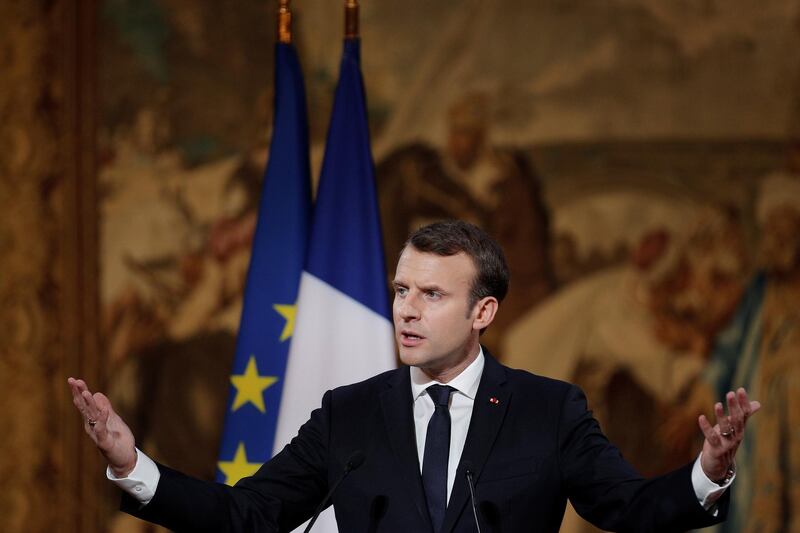In a year of many elections, voters across the world consistently sought out a different kind of politician. Mostly, they are young and offer radically different visions for their countries.
Since June 2016, six prominent world leaders under the age of 45 have been elected to govern.
Estonia’s Jüri Ratas, 38, was elected in November 2016, Emmanuel Macron, 40, became the president of France in May 2017, Ireland’s Leo Varadkar, 38, became prime minister in June 2017, New Zealand’s prime minister Jacinda Ardern, 37, was elected in October 2017, Iceland’s Katrín Jakobsdóttir, 41, was voted in on November 2017 and Austria’s Sebastian Kurz, 31, took office as chancellor in mid-December.
Even though many of these politicians had backgrounds away from government, they offered alternative visions for their countries.
Mr Kurz, the youngest in this political playgroup and known in the Austrian tabloids as Wunderwuzzi or “wonderkid”, is responsible for Austria becoming the only Western European state with a governing far-right party. Known for driving Austria’s burka ban, he was elected on a populist anti-immigration platform cashing in on the backlash that followed the country’s recent generous acceptance of migrants.
The main selling point Mr Kurz offered the electorate was change. Despite the fact that he had already been in politics for almost a decade and had been foreign minister of Austria since 2013, the election posters for him and his party, the Austrian People’s Party (OVP), fore the slogan, “Time for something new”.
Age may be motivating some voters, but Georgina Wright, a researcher in Chatham House’s Europe Programme, believes the election of these younger politicians reflects broader structural changes in the way election campaigns are run and how people are voting.
"Voters are also [now] much more volatile and tend to identify with a person rather than a party, so a lot of the campaigns actually revolve around leaders and less around party and party affiliation and ideology," she tells The National.
“If you take public support in traditional left and right wing parties, you can see evidence that the public support for those parties is eroding. Party membership is in decline … you can also see evidence of an ideological shift in many parties on the left or the right, either towards the centre or to the more extreme right and left.”
Ms Wright also believes the way elections are run is radically changing, thanks to the influence of campaigning on Twitter and other social media platforms. This has helped create a space where heads of state are increasingly charismatic characters with a very personal style of leadership.
“Macron won on a very centrist platform, and it was quite radical in France. He didn’t come from a party that was traditional left or right, and he was able to mobilise voters across the political spectrum,” Ms Wright says. Much of his success, she adds, was also down to his own charisma and style of leadership.
Mr Macron and his peers have worked swiftly to establish their authority once in office, clearly determined to push their policies while their support is still strong.
Though it is usual for French leaders to take a serious hit in the polls after ascending to the presidency, Mr Macron’s falling poll figures were alarmingly stark. Elected with a dazzling 66 per cent of the vote in May, October saw his popularity sink to 44 per cent in the Ifop poll. The slump was due his considerable shake-up of French labour laws. issuing decrees on reforms and policy changes which were hugely unpopular, such as making it easier to fire employees and capping severance pay-outs.
In his first live prime time interview five months into his presidency, Mr Macron was accused of being cut off from ‘real life’ and showing disdain for the working class. His decision to axe the role of a minister for terror victims saw the president greeted with anger at the second anniversary of the Bataclan terror attack, in which 130 people were killed in Paris.
Now, barely more than a month on from his lowest poll point, the youngest leader of France since Napoleon boasts the fastest approval rating rebound for French presidents. His popularity has risen above 50 per cent for the first time since he was elected, with people approving of the way he defends his country's interests abroad.
Dr Alexandra Gerbasi, professor of leadership at University of Exeter, explains that recent research suggests when people want change they look to younger leaders and when they want stability they look for older ones. Dr Gerbasi cites historical precedents of Fidel Castro, who rose to power at 33, and Napoleon at 30.
“Younger individuals tend to be better at fluid intelligence, the type that allows people to come up with creative solutions. When dealing with unprecedented problems, novel solutions can be a real asset, hence many transformative businesses are led by younger individuals, as when we are looking for guidance dealing with unprecedented problems in the world, the electorate is looking for new solutions,” she explains.
A seventh youthful leader, Saudi Arabia’s Mohammed bin Salman, 32, was elevated to Crown Prince in the summer of 2017. The Crown Princehas the wide backing of the country’s overwhelmingly youthful population, who feel they can relate to the man who looks, speaks and thinks like them — and is also of their generation.
He has sought to make a big impact in a short period of time under his father’s rule. Playing a leading role in the country’s new anti-corruption laws, an ambitious restructuring of the economy through the Vision 2030 project and dramatic social changes, such as allowing women to drive, Mohammed bin Salman is now one of the most prominent names on the world stage.





